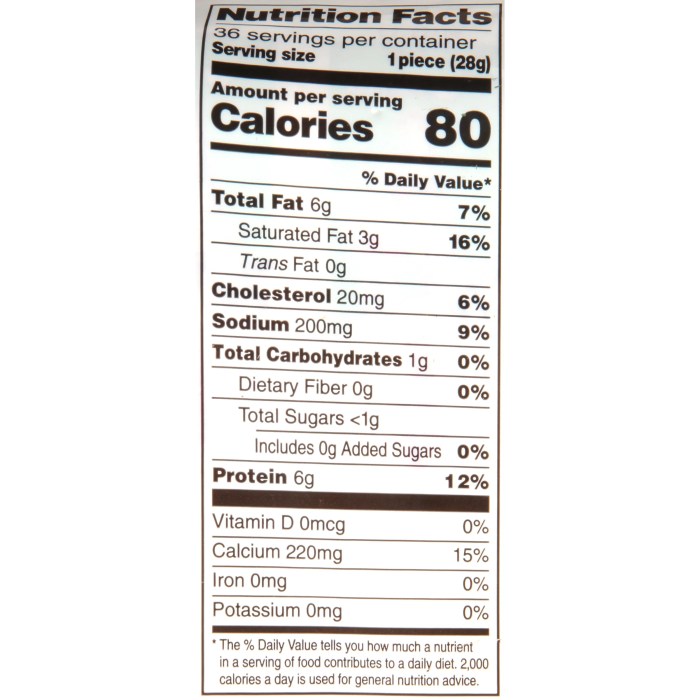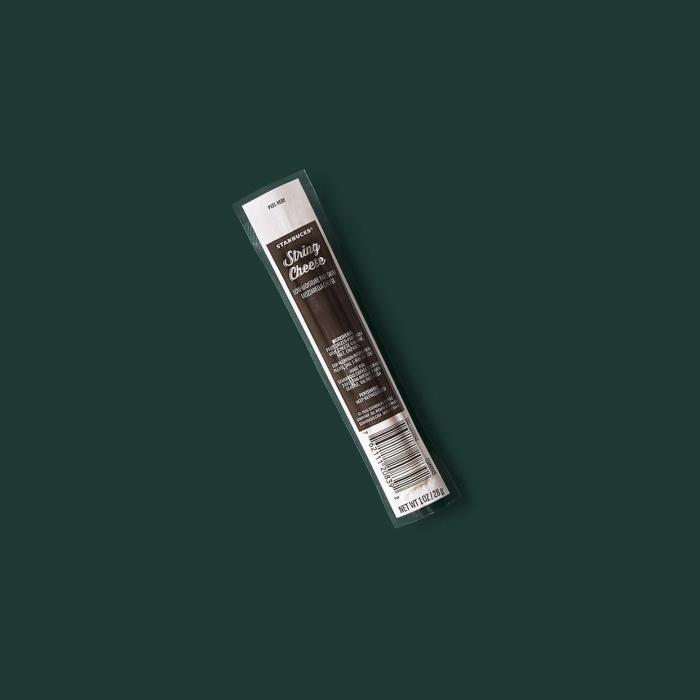Ingredient Analysis

Starbucks string cheese nutrition – Starbucks string cheese, while a convenient snack, contains a range of ingredients that contribute to its flavor, texture, and shelf life. Understanding these ingredients is crucial for consumers with dietary restrictions or those seeking to make informed food choices. This section details the typical components of Starbucks string cheese, highlighting potential allergens and additives.
Starbucks string cheese provides a quick, portable protein boost, but its nutritional profile is relatively simple. For a higher-calorie, more complex cheesy indulgence, consider the crispy cheesy cheese burrito Taco Bell nutrition facts; however, remember that Starbucks string cheese offers a lower-fat, more controlled portion size for those watching their intake.
A typical Starbucks string cheese product contains a blend of ingredients designed to achieve a specific taste and texture. While the exact formulation may vary slightly depending on the specific product and production batch, the core components remain consistent.
Ingredients in Starbucks String Cheese
The primary ingredients in Starbucks string cheese are generally pasteurized milk, cheese culture, salt, and enzymes. These components form the base of the cheese, providing the characteristic flavor and texture. However, depending on the specific variety, additional ingredients might be included to enhance flavor or texture, such as whey, milkfat, and natural flavors. Some varieties may also contain added calcium for nutritional enhancement.
Potential Allergens in Starbucks String Cheese
Individuals with milk allergies should avoid Starbucks string cheese, as milk is a primary ingredient. The presence of whey, another milk derivative, further reinforces this allergy concern. It’s also important to note that while less common, cross-contamination during processing could potentially introduce allergens from other products manufactured in the same facility. Always check the product label for a complete allergen statement, as formulations can change.
Additives and Preservatives in Starbucks String Cheese
Many processed foods, including string cheese, contain additives and preservatives to maintain quality and extend shelf life. While the specific additives used by Starbucks may vary, common examples include enzymes (used in cheese making for coagulation and flavor development) and potentially sodium citrate (which can act as a pH adjuster and emulsifier). These additives are generally considered safe for consumption at the levels typically used in food products, but individuals with specific sensitivities should consult the ingredient list and their physician if concerned.
The function of each additive is usually detailed on the product packaging. For example, sodium citrate’s role in maintaining the cheese’s texture and preventing separation is clearly beneficial for both quality and consumer satisfaction.
Pricing and Availability

Starbucks string cheese pricing and availability can vary depending on location and time of year. While not a core menu item like coffee, its presence is often tied to promotional periods or regional availability. Understanding its cost and accessibility requires looking at both in-store options and any potential online purchasing routes.Starbucks string cheese is typically sold individually or in small multi-packs.
The price per unit generally falls within the range of other premium snack cheeses found in cafes or convenience stores. Expect to pay slightly more than you would for a comparable product at a grocery store, reflecting the premium pricing associated with Starbucks’ brand and in-store convenience.
Starbucks String Cheese Price Points
The price of Starbucks string cheese is not consistently published across all locations. Anecdotal evidence suggests prices typically range from $1.50 to $3.00 per individual serving, or slightly less per unit when purchased in a multi-pack. This price reflects the premium nature of the product and its convenient availability within a busy cafe environment. Direct comparisons to other similarly-sized and packaged cheese sticks from brands like Kraft or Sargento would reveal a price premium for the Starbucks offering.
Starbucks String Cheese Distribution Channels
Starbucks string cheese is primarily available for purchase within participating Starbucks locations. It is not consistently offered as a regular menu item across all stores. Its availability is more sporadic, often tied to seasonal promotions or limited-time offerings. Online ordering through the Starbucks app or website is generally not an option for this product; it’s primarily a grab-and-go item for in-store customers.
Therefore, accessibility relies heavily on visiting a physical Starbucks store and checking for its presence among other snack options.
Cost-Effectiveness Comparison, Starbucks string cheese nutrition
Compared to similar string cheese products from mainstream brands, Starbucks string cheese is generally less cost-effective on a per-unit basis. Grocery stores offer larger multi-packs of comparable string cheese at a significantly lower overall price. However, the convenience of purchasing Starbucks string cheese alongside a coffee or other beverage offsets this higher cost for some consumers who value convenience and a one-stop shop for their food and beverage needs.
The added cost can be viewed as a premium for the convenience and brand association.
Expert Answers: Starbucks String Cheese Nutrition
Is Starbucks string cheese organic?
Starbucks does not currently offer organic string cheese. Check the ingredient list for specific details on sourcing.
Does Starbucks string cheese contain lactose?
Yes, as it’s a dairy product, it contains lactose. Individuals with lactose intolerance should proceed with caution.
Where can I find the most accurate nutritional information?
Always refer to the nutrition label on the Starbucks string cheese packaging for the most accurate and up-to-date nutritional information.
Are there gluten-free options?
Typically, string cheese is gluten-free, but always check the ingredient list to ensure it’s suitable for those with gluten sensitivities.
